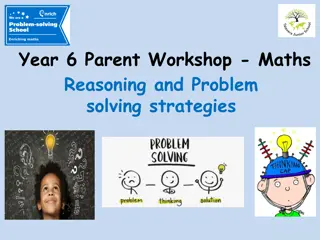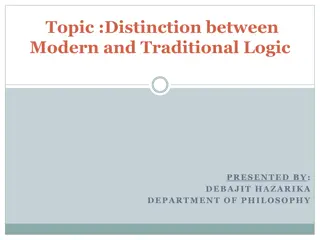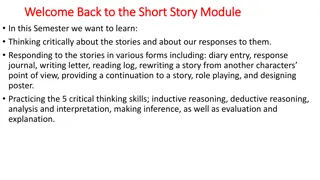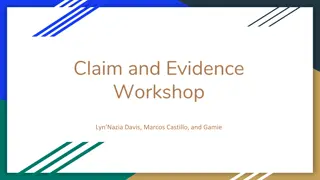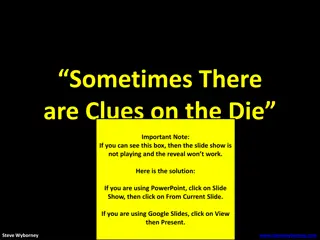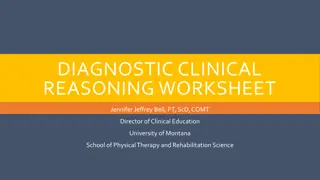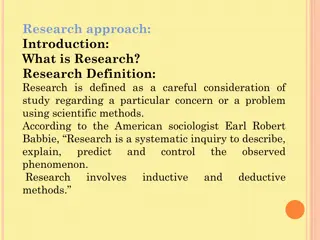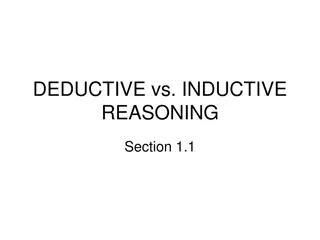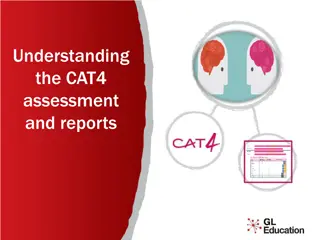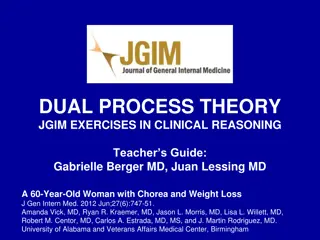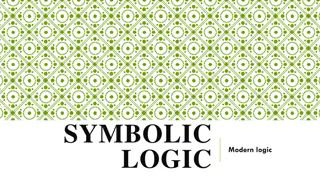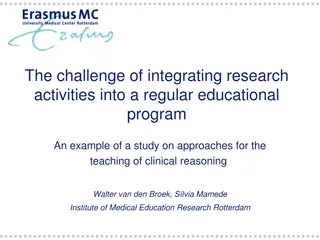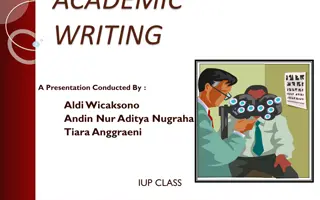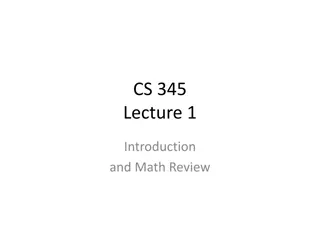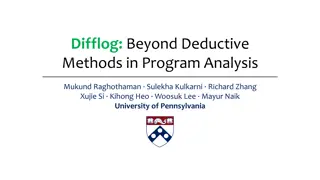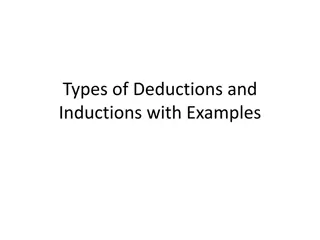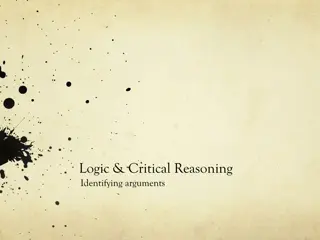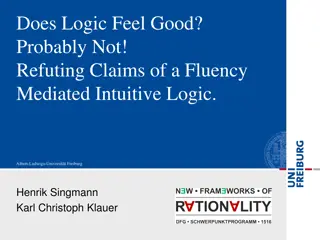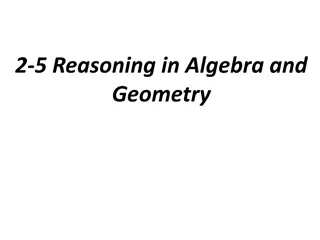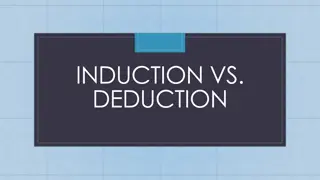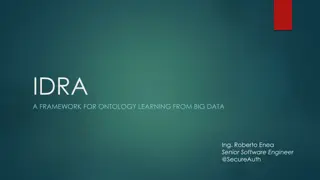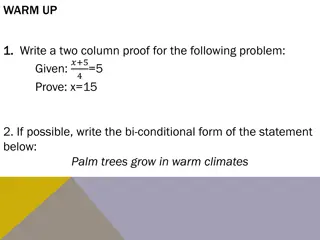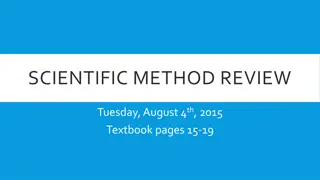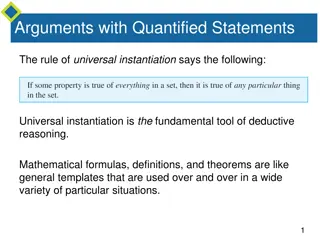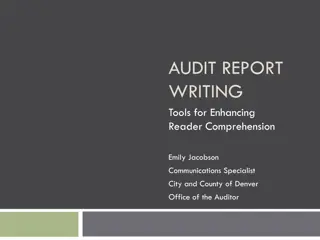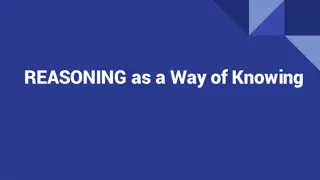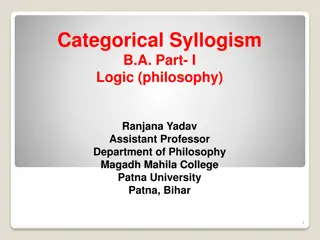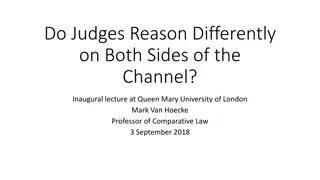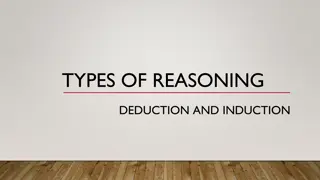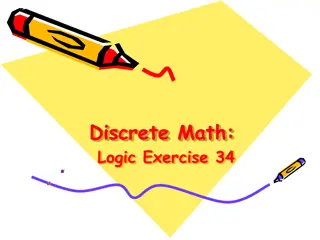Understanding Logical Form and Equivalence in Conditional Statements
Delve into the intricacies of logical form, equivalence, and compound statements in the realm of propositional logic. Explore valid and invalid arguments, conditional statements, and the logic of compound statements with puzzles to sharpen your logical reasoning skills. Unravel scenarios like determ
2 views • 81 slides
Enhancing Math Skills for Year 6 Students Through Reasoning and Problem-Solving
Explore the shift towards math mastery, reasoning, and problem-solving strategies in Year 6 parent workshops. Learn why these methods differ from traditional approaches, emphasizing understanding over rote memorization. Discover the key skills needed for mathematical reasoning and how to support you
0 views • 23 slides
Understanding Inductive and Deductive Reasoning
Inductive reasoning involves drawing general conclusions from specific observations, while deductive reasoning starts with general premises to derive specific conclusions. Induction uses experience or experimental evidence to make broad conclusions, while deduction follows from general to specific.
5 views • 7 slides
Understanding Quantified Statements
Explore the logic of quantified statements, including universal instantiation, universal modus ponens, and examples illustrating the application of these concepts using variables, predicates, and symbols. Dive into the reasoning behind statements involving particular instances within a domain, and s
6 views • 22 slides
Topic : Distinction between Modern and Traditional Logic.
Logic, as a normative study, focuses on distinguishing correct reasoning from incorrect. Traditional logic, based on Aristotle's work, emphasized syllogistic reasoning, while modern logic, pioneered by figures like Leibnitz and Russell, employs mathematical methods and symbolic logic for a more adva
2 views • 10 slides
Engaging with Critical Thinking in Short Stories
Explore different ways of responding to short stories, from diary entries to role-playing, while honing critical thinking skills like deductive and inductive reasoning. Delve into character analysis, themes, and personal reflections to enhance understanding and engagement with the author's work.
0 views • 32 slides
Mastering the Toulmin Method for Constructing Persuasive Arguments
Learn how to effectively structure arguments using the Toulmin Method, which consists of Claim, Data, Warrant, Backing, Counterclaim, and Rebuttal elements. Explore reasoning and logic concepts, differentiate between inductive and deductive reasoning, and understand how to construct valid arguments
0 views • 30 slides
Esti-Mystery Number Sense Clue Challenge
Explore the Esti-Mystery challenge where you narrow down the possibilities of the number of game pieces based on a series of clues. Use estimation and deductive reasoning to reach the final answer of 47 game pieces. Engage in a fun and educational activity designed to enhance number sense and critic
0 views • 6 slides
Clinical Reasoning Worksheet for Differential Diagnoses
A Diagnostic Clinical Reasoning Worksheet created by Jennifer Jeffrey Bell, PT, ScD, COMT, to guide students through the diagnostic process, enhancing their clinical reasoning skills. The worksheet helps in selecting appropriate diagnoses based on patient demographics, describing patient presentatio
0 views • 9 slides
Understanding the Fundamentals of Research: A Comprehensive Overview
Research is a systematic inquiry aimed at understanding, describing, explaining, and predicting phenomena using scientific methods. It involves both inductive and deductive approaches, with a focus on logical reasoning and real-time data collection. Key characteristics include a systematic approach,
5 views • 11 slides
Understanding Deductive Reasoning and Problem Solving in Logic
Explore the concepts of deductive reasoning, problem-solving logic, and Venn diagrams in this informative content. Learn about the process of drawing conclusions from known facts, using syllogisms to make valid arguments, and understanding the difference between truth and validity in deductive reaso
7 views • 16 slides
Understanding the CAT4 Assessment and Reports
CAT4, the Cognitive Abilities Test Fourth Edition, assesses students' abilities in verbal, quantitative, non-verbal, and spatial reasoning. It distinguishes between ability and attainment testing and is used to identify academic potential, understand student thinking, determine support needs, highli
1 views • 15 slides
Dual Process Theory in Clinical Reasoning: A Case Study Analysis
Understanding dual process theory in clinical reasoning is crucial for healthcare professionals. This case study delves into the application of System 1 and System 2 thinking in diagnosing a 60-year-old woman presenting with chorea and weight loss. System 1 involves intuitive, quick decision-making
2 views • 24 slides
Understanding Bayesian Reasoning: A Comprehensive Overview
Bayesian reasoning involves utilizing probabilities to make inferences and decisions in the face of uncertainty. This approach allows for causal reasoning, decision-making under uncertainty, and prediction based on available evidence. The concept of Bayesian Belief Networks is explored, along with t
1 views • 33 slides
Understanding Symbolic Logic: A Modern Approach
Delve into the world of symbolic logic where traditional and modern approaches differ. Learn how symbolic languages help overcome challenges with natural languages, leading to a clearer understanding of deductive reasoning through the analysis of premises, conclusions, compound statements, and logic
1 views • 32 slides
Enhancing Clinical Reasoning Training in Medical Education
Integrating research activities into educational programs is essential for advancing clinical reasoning training in medical education. This study explores different teaching approaches for clinical reasoning, focusing on addressing traditional teaching drawbacks and implementing simulation encounter
0 views • 31 slides
Mastering the Art of Academic Writing
Understand the essence of academic writing, focusing on problem-solving, deductive reasoning, and evidence-based arguments. Learn the purpose, methodology, and key tips to enhance your writing quality and presentation in academic settings.
1 views • 21 slides
CS 345 Lecture 1: Introduction and Math Review
This content encompasses the introduction and mathematical review covered in CS 345 lecture 1, including topics such as sets, sequences, logarithms, logical equivalences, and proofs. It delves into sets theory, mathematical operations, deductive reasoning, and examples like the conjecture of even nu
0 views • 68 slides
Advancements in Program Analysis Beyond Deductive Methods
Explore the evolution of program analysis beyond deductive methods with innovative tools like static analyzers and data-driven analysis design. Discover the challenges faced, such as undecidable analysis questions and scalability issues, and the strategies employed to address them. Learn about the s
0 views • 24 slides
Understanding Deductive and Inductive Reasoning
Explore the world of deductive and inductive arguments through examples of deductive reasoning based on definitions and math, including categorical syllogisms, hypothetical syllogisms, and disjunctive syllogisms. Delve into inductive reasoning and the key distinctions between deductive and inductive
0 views • 26 slides
Understanding Logic and Critical Reasoning: Identifying Arguments
In the study of logic and critical reasoning, identifying arguments is a fundamental task. Arguments consist of premises supporting a conclusion, and they can be identified by specific indicators and techniques. Understanding argument structure and types of support, such as deductive and inductive,
2 views • 15 slides
Understanding Laws of Logic and Logical Reasoning
Laws of logic play a crucial role in reasoning and making deductions. This comprehensive guide explains the use of contrapositives, examples of conditional statements, and the significance of laws like the Law of Syllogism. Understanding these principles helps in effectively analyzing statements and
0 views • 8 slides
Understanding Deductive Reasoning and Intuitive Logic
Deductive reasoning involves assessing the validity of arguments based on premises, while fluency-mediated intuitive logic suggests people have an intuitive sense of logicality. Challenges arise in drawing correct conclusions from abstract syllogisms, indicating a need for deliberate and effortful p
0 views • 24 slides
Algebra and Geometry Reasoning: Concepts and Proofs
Explore key concepts in algebra and geometry reasoning, including properties of equality, distributive property, and proofs using deductive reasoning. Practice solving equations, identifying properties of congruence, and writing two-column proofs to justify mathematical statements.
0 views • 13 slides
Next-Generation Logic for Program Verification Challenges
Explore the innovative work by Gennaro Parlato and collaborators on a new logic for reasoning with programs that manipulate heap and data using deductive verification and SMT solvers. This research delves into the complexities of unbounded structures and data, addressing challenges in classical theo
0 views • 31 slides
Understanding Deductive and Inductive Reasoning in Problem-Solving
Explore the differences between deduction and induction in problem-solving approaches. Deductive reasoning starts with a general statement and moves to specifics, offering certainty and objectivity, while inductive reasoning begins with specifics and arrives at a generalization, providing flexibilit
0 views • 11 slides
Framework for Ontology Learning from Big Data with IDRA
IDRA (Inductive Deductive Reasoning Architecture) presents a comprehensive framework for ontology learning, focusing on data modeling and architecture components. ETL (Extract Transform Load) processes play a vital role in semantic enhancement of data, especially in identity and access governance co
0 views • 25 slides
Introduction to Code Reasoning in CSE331 Lecture
In this lecture, we delve into the fundamentals of code reasoning, focusing on forward and backward reasoning techniques in straight-line and if-statement code. The session includes reviewing the practice of identifying the strongest assertions and understanding the dual purposes of proving code cor
0 views • 24 slides
Logic in Mathematics and Deductive Reasoning
Delve into the principles of logical deduction in mathematics through examples of conditional statements, syllogisms, and proofs. Explore how deductive reasoning can lead to valid conclusions based on given premises.
0 views • 12 slides
Understanding Economic Models: Assumptions, Deductive Reasoning, and Logical Fallacies
Economic models utilize deductive reasoning to simplify real-world economic relationships. Assumptions vs. implications are key components, where assumptions reflect reality or are simplifying. This process helps identify conditions for specific outcomes to occur and distinguishes between consequent
1 views • 17 slides
Understanding the Scientific Method and Objective Approach
Explore the steps of the scientific method, importance of objectivity, and key concepts like hypothesis, null hypothesis, accuracy, precision, and sample size. Distinguish between inductive and deductive reasoning, as well as theory versus natural law in scientific research.
0 views • 12 slides
Introduction to Logical Thinking in Computer Science at VSB - Technical University of Ostrava
This course introduces the concept of logical thinking in Computer Science at VSB - Technical University of Ostrava. Topics include valid arguments, deductive reasoning, and the science of correct reasoning. Requirements for passing the course include written tests and exams with specified grade ran
0 views • 18 slides
Understanding Universal Instantiation in Deductive Reasoning
Universal instantiation is a crucial tool in deductive reasoning, allowing us to derive specific conclusions from general statements. By combining universal instantiation with modus ponens and modus tollens, we can construct valid arguments such as universal modus ponens and universal modus tollens.
0 views • 13 slides
Enhancing Reader Comprehension in Audit Report Writing
Tools for improving reader comprehension in audit report writing, including deductive writing, economy of words, and descriptive headings. Learn the difference between inductive and deductive writing and how to make audit reports more engaging and informative. Practical examples provided.
0 views • 43 slides
Exploring Reasoning as a Method of Knowledge Acquisition
Reasoning serves as a fundamental way of knowing, enabling individuals to transcend immediate experiences, build knowledge, and evaluate beliefs. This process involves the application of logic, examining the interplay between beliefs, ideas, and truth. By integrating reason with imagination, individ
0 views • 37 slides
Understanding Categorical Syllogism in Logic: A Comprehensive Overview
Categorical syllogism, a form of inference with two premises and a conclusion, is a fundamental concept in logic. This type of deductive argument consists of three categorical propositions - universal affirmative, universal negative, particular affirmative, and particular negative. Terms such as maj
0 views • 16 slides
Contrasting Legal Reasoning in Common Law and Continental Law Systems
This inaugural lecture explores the differences in legal reasoning between judges on both sides of the English Channel. It delves into the declaratory theory of decision-making in Common Law and the application of legislative intent in Continental Law. The lecture also touches on the contrasting ind
0 views • 48 slides
TYPES OF REASONING DEDUCTION AND INDUCTION
Reasoning involves a connected sequence of thoughts leading to a conclusion. Deductive reasoning moves from general to specific, identifying assumptions and hidden premises. Categorical syllogisms demonstrate valid and sound argument structures, while real-life arguments may require uncovering assum
0 views • 21 slides
Forms of Moral Reasoning and Ethics in Decision-Making
Explore the main forms of moral reasoning in ethical decision-making, including virtue ethics, deontological reasoning, and teleological reasoning. Understand the importance of developing ethical virtues and principles in guiding behavior. Delve into examples of reasoning from virtue and deontologic
0 views • 28 slides
Professor Coffee Conundrum
Three professors in a restaurant are asked if everyone wants coffee. The first and second professors don't know, but the third professor says not everyone wants coffee. By logic, the hostess figures out who wants coffee and serves accordingly. This exercise showcases deductive reasoning in a fun sce
0 views • 4 slides

